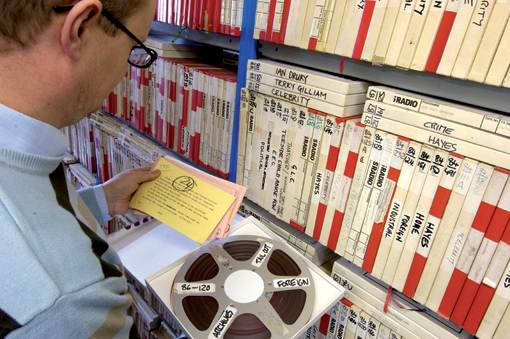Are We Listening?
Just how prevalent is the use of radio material as an archival primary source and in teaching? Dr. Ieuan Franklin presents new research undertaken by Bournemouth University to gauge the level of academic access to radio archives in the UK.
 About the Author: Dr Ieuan Franklin is a Lecturer in Film and Media Theory at Bournemouth University/Wiltshire College.. He was previously the Research Assistant on the AHRC-funded Channel 4 Television and British Film Culture project. His publications include: ‘Think-Tape : The Aesthetics of Montage in the Post-War Television Documentary ‘, in J. Jacobs and S. Peacock (Eds.), Television Aesthetics and Style (Continuum – forthcoming, 2013) and ‘Rambling House and The Barrelman: folklore and audience participation in radio broadcasting in Ireland and Newfoundland’ in Across the Water: Irish Journal of Newfoundland and Labrador Research 1(1), 13-32 (2009).
About the Author: Dr Ieuan Franklin is a Lecturer in Film and Media Theory at Bournemouth University/Wiltshire College.. He was previously the Research Assistant on the AHRC-funded Channel 4 Television and British Film Culture project. His publications include: ‘Think-Tape : The Aesthetics of Montage in the Post-War Television Documentary ‘, in J. Jacobs and S. Peacock (Eds.), Television Aesthetics and Style (Continuum – forthcoming, 2013) and ‘Rambling House and The Barrelman: folklore and audience participation in radio broadcasting in Ireland and Newfoundland’ in Across the Water: Irish Journal of Newfoundland and Labrador Research 1(1), 13-32 (2009).
NB: This is a shorter version of an article that first appeared in the December 2011 issue of Viewfinder.
Before the era of digitisation and rich metadata it was said that it was easier to discover what plays were staged in London in the 1660s than it was to identify the drama transmitted on radio and television in the 1950s. This could not entirely be blamed on the low status which modern popular culture had often been assigned by the ‘Leavisite’ tradition in academia and education, as even the Victorian music hall was better served by reference works than radio and television!
Now it is commonly held that the ‘information society’ will help us to conserve our audio-visual heritage, and there are many researchers and authors that specialize in the history of broadcasting, which is an established subject in education and academia. Someone researching the history of radio nowadays is better served in terms of academic texts and research resources (now including a digital archive of The Listener, and listings from the Radio Times) than ever before. Yet how easy is it for researchers and historians to pursue the opportunity to, in Marvin Bensman’s words, ‘go beyond the printed descriptions to the primary source material of our age’?
Just how prevalent is the use of broadcast materials as an archival primary source, or in teaching? How easy is it to find these materials, and to gain access to them, and what are the current challenges and limitations for someone undertaking this activity? How can access to our audio heritage be facilitated and radically expanded, and what will be the impact of this on education provision and published work?
These are some of the questions posed by an initiative at Bournemouth University to assess the current state of play as regards academic access to radio archives in the UK, and to provide evidence of how radio archives are currently being used in research and teaching. For several months Dr Kristin Skoog and I have been writing a report on this topic, which we hope will identify issues of concern or interest to the archive community, to broadcasting organizations, and to the research/HE community. In doing so we are fortunate to have enlisted the help of the British Library’s Curator of Radio, Paul Wilson.

Matt Holland inspects some of the radio holdings held at Bournemouth University.

 Learning on Screen
Learning on Screen